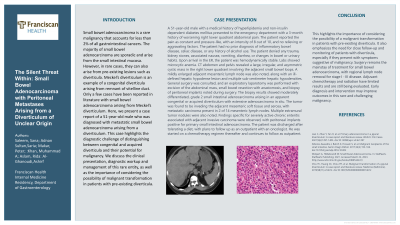Sunday Poster Session
Category: Small Intestine
P1286 - The Silent Threat Within: Small Bowel Adenocarcinoma with Peritoneal Metastases Arising from a Diverticulum of Unclear Origin
Sunday, October 22, 2023
3:30 PM - 7:00 PM PT
Location: Exhibit Hall

Has Audio
.jpg)
Sana Saleem, MD
Franciscan Health
Willow Springs, IL
Presenting Author(s)
Sana Saleem, MD1, Saria Adnan Sultan, DO1, Peter Makar, DO2, Mohammed A. Khan, MS, DO3, Rida Aslam, DO4, Ashirf Al-Ghanoudi, MD, MPH, FACG4
1Franciscan Health, Chicago, IL; 2Franciscan Alliance, Olympia Fields, IL; 3Franciscan Health Olympia Fields, Chicago, IL; 4Franciscan Health Olympia Fields, Olympia Fields, IL
Introduction: Small bowel adenocarcinoma is a rare malignancy that accounts for less than 2% of all gastrointestinal cancers. The majority of small bowel adenocarcinoma are sporadic and arise from the small intestinal mucosa. Rarer are the cases when they may also arise from pre-existing lesions such as diverticula. Meckel’s diverticulum is a congenital diverticulum arising from remnant of vitelline duct. Only a few cases have been reported in literature with small bowel adenocarcinoma arising from Meckel’s diverticulum.
Case Description/Methods: A 51-year-old male with past medical history of hyperlipidemia and non-insulin dependent diabetes mellitus presented to the emergency with a 3-month history of worsening right lower quadrant abdominal pain. Denied any associated nausea, vomiting, diarrhea, or changes in bowel or urinary habits. Upon arrival in the ER, the patient was hemodynamically stable. CT abdomen and pelvis revealed a large, irregular, and asymmetric cystic mass in the right lower quadrant involving the adjacent small bowel loops along with adjacent mesenteric lymph node and an hepatic hypodense lesion with multiple hepatic hypodensities. General surgery was consulted, and exploratory laparotomy was performed with excision of the abdominal mass, small bowel resection with anastomosis, and biopsy of peritoneal implants noted during surgery. Biopsy showed moderately differentiated, grade 2 small intestinal adenocarcinoma arising in an apparent congenital or acquired diverticulum with extensive adenocarcinoma in situ. The tumor invaded the adjacent mesenteric soft tissue and serosa, and 2 of 14 mesenteric lymph nodes. Multiple extramural tumor nodules are present as well. Peritoneal implants were positive for primary small intestinal adenocarcinoma. The patient was discharged with plans to follow up as an outpatient. He started chemotherapy and continues to follow as an outpatient.
Discussion: Malignant transformation of Meckel diverticulum affects up to 3.2% of symptomatic patients. This case highlights importance of malignant transformation with pre-existing diverticulum and a need for close follow-up. Several hereditary syndromes and proinflammatory conditions have been associated but diverticula should be in mind as well. Surgery is mainstay of treatment. Adjuvant chemotherapy and radiation have limited results. With this case report we hope to contribute to cases with this rare entity and create an awareness to monitor patients with a small intestinal diverticulum.
Disclosures:
Sana Saleem, MD1, Saria Adnan Sultan, DO1, Peter Makar, DO2, Mohammed A. Khan, MS, DO3, Rida Aslam, DO4, Ashirf Al-Ghanoudi, MD, MPH, FACG4. P1286 - The Silent Threat Within: Small Bowel Adenocarcinoma with Peritoneal Metastases Arising from a Diverticulum of Unclear Origin, ACG 2023 Annual Scientific Meeting Abstracts. Vancouver, BC, Canada: American College of Gastroenterology.
1Franciscan Health, Chicago, IL; 2Franciscan Alliance, Olympia Fields, IL; 3Franciscan Health Olympia Fields, Chicago, IL; 4Franciscan Health Olympia Fields, Olympia Fields, IL
Introduction: Small bowel adenocarcinoma is a rare malignancy that accounts for less than 2% of all gastrointestinal cancers. The majority of small bowel adenocarcinoma are sporadic and arise from the small intestinal mucosa. Rarer are the cases when they may also arise from pre-existing lesions such as diverticula. Meckel’s diverticulum is a congenital diverticulum arising from remnant of vitelline duct. Only a few cases have been reported in literature with small bowel adenocarcinoma arising from Meckel’s diverticulum.
Case Description/Methods: A 51-year-old male with past medical history of hyperlipidemia and non-insulin dependent diabetes mellitus presented to the emergency with a 3-month history of worsening right lower quadrant abdominal pain. Denied any associated nausea, vomiting, diarrhea, or changes in bowel or urinary habits. Upon arrival in the ER, the patient was hemodynamically stable. CT abdomen and pelvis revealed a large, irregular, and asymmetric cystic mass in the right lower quadrant involving the adjacent small bowel loops along with adjacent mesenteric lymph node and an hepatic hypodense lesion with multiple hepatic hypodensities. General surgery was consulted, and exploratory laparotomy was performed with excision of the abdominal mass, small bowel resection with anastomosis, and biopsy of peritoneal implants noted during surgery. Biopsy showed moderately differentiated, grade 2 small intestinal adenocarcinoma arising in an apparent congenital or acquired diverticulum with extensive adenocarcinoma in situ. The tumor invaded the adjacent mesenteric soft tissue and serosa, and 2 of 14 mesenteric lymph nodes. Multiple extramural tumor nodules are present as well. Peritoneal implants were positive for primary small intestinal adenocarcinoma. The patient was discharged with plans to follow up as an outpatient. He started chemotherapy and continues to follow as an outpatient.
Discussion: Malignant transformation of Meckel diverticulum affects up to 3.2% of symptomatic patients. This case highlights importance of malignant transformation with pre-existing diverticulum and a need for close follow-up. Several hereditary syndromes and proinflammatory conditions have been associated but diverticula should be in mind as well. Surgery is mainstay of treatment. Adjuvant chemotherapy and radiation have limited results. With this case report we hope to contribute to cases with this rare entity and create an awareness to monitor patients with a small intestinal diverticulum.
Disclosures:
Sana Saleem indicated no relevant financial relationships.
Saria Adnan Sultan indicated no relevant financial relationships.
Peter Makar indicated no relevant financial relationships.
Mohammed Khan indicated no relevant financial relationships.
Rida Aslam indicated no relevant financial relationships.
Ashirf Al-Ghanoudi indicated no relevant financial relationships.
Sana Saleem, MD1, Saria Adnan Sultan, DO1, Peter Makar, DO2, Mohammed A. Khan, MS, DO3, Rida Aslam, DO4, Ashirf Al-Ghanoudi, MD, MPH, FACG4. P1286 - The Silent Threat Within: Small Bowel Adenocarcinoma with Peritoneal Metastases Arising from a Diverticulum of Unclear Origin, ACG 2023 Annual Scientific Meeting Abstracts. Vancouver, BC, Canada: American College of Gastroenterology.
